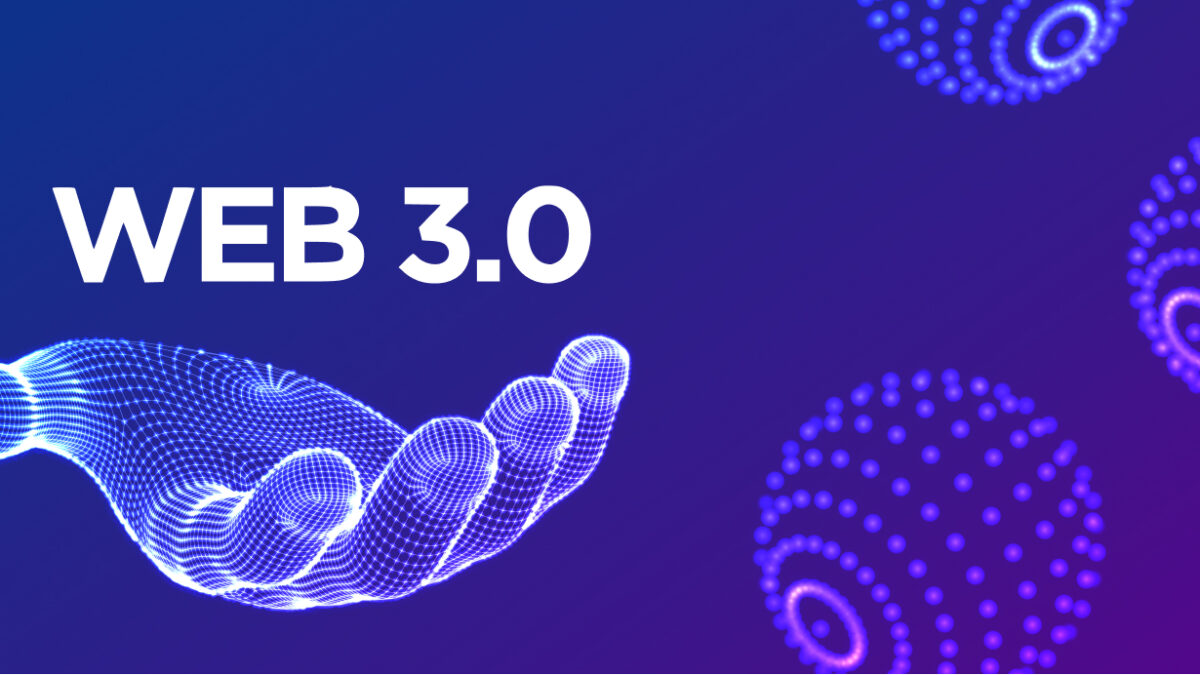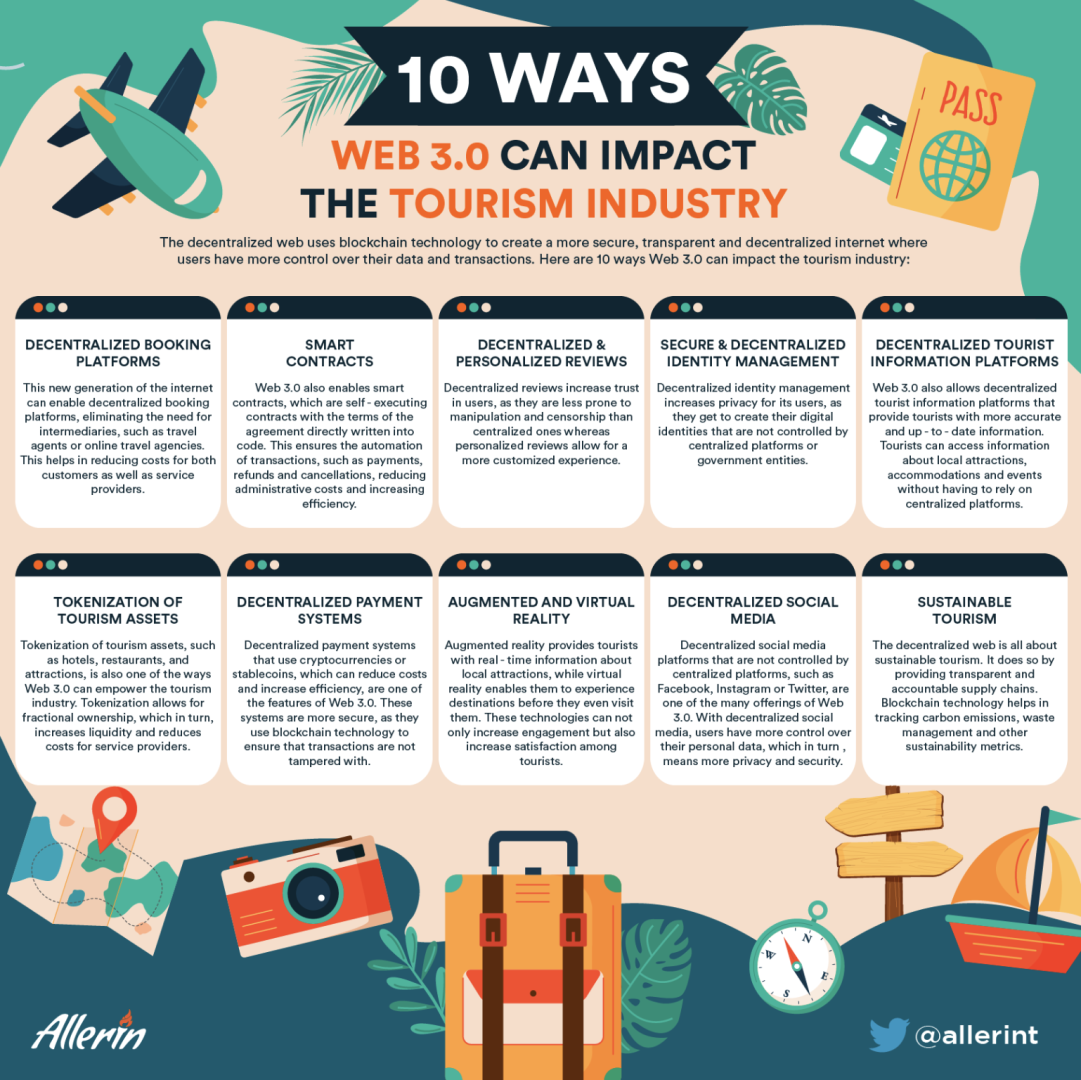Comments
- No comments found

Web 3.0 in tourism is the next generation of the internet to provide the industry with a more transparent environment for users as well as service providers.
This environment allows for a safe, secure, efficient and decentralized space for them to interact and exchange data.
Ever wondered what the future of the internet looks like? Well, the answer to that is pretty simple. Web3, or Web 3.0, is quite possibly going to be the future of the internet. In fact, a study shows that the global Web 3.0 blockchain market revenue is expected to increase up to USD $23.3 billion in the year 2028.
Businesses belonging to various industries are leaning towards rapidly growing technology innovation. And the primary reason for it is that it is driven by growing transparency. To fully understand the potential of Web 3.0 in tourism, one must first have an in-depth knowledge of it.
Simply put, Web 3.0, also known as the decentralized web or the blockchain web, is the next and most recent generation of the internet that is built on decentralized technology. It is a new paradigm for the internet that aims to provide a more transparent, secure and decentralized environment for users and allows them to interact and exchange value.
It not only builds on the existing technologies of Web 1.0 and Web 2.0, but it also differs from them in several key aspects. For instance, Web 1.0 was the very first iteration of the internet, which focused primarily on static content, such as HTML web pages, while Web 2.0 introduced its users to dynamic content and social media. However, Web 2.0 is largely controlled by large centralized entities such as Facebook, Google and Amazon. This means that they can be prone to censorship, surveillance and data breaches at any given point.
But Web 3.0 is different compared to the first two. It aims to address the above-mentioned issues by using decentralized technologies such as blockchain, peer-to-peer networking and smart contracts. Where blockchain is a distributed ledger technology that enables secure and transparent record-keeping, peer-to-peer networking allows direct interactions between users without the need for intermediaries and smart contracts are self-executing contracts where the terms of the agreement are directly written into the code.
Web 3.0 enables decentralized applications (dApps) that run on blockchain technology and operate without intermediaries. dApps allow secure and transparent transactions, identity management and even data storage.
It supports the creation of decentralized marketplaces for goods and services, where buyers and sellers can interact directly without the need for intermediaries. This helps in increasing efficiency, reducing costs and increasing transparency for both - buyers as well as sellers.
This rapidly growing technology has the potential to drastically alter many industries, such as finance, healthcare, education, tourism and more. And it can do so by enabling new business models which help in reducing costs and increase overall efficiency.
The decentralized web uses blockchain technology to create a more secure, transparent and decentralized internet where users have more control over their data and transactions. This can truly have a significant impact on the tourism industry.
Here are 10 ways Web 3.0 can impact the tourism industry:
This new generation of the internet can enable decentralized booking platforms, eliminating the need for intermediaries, such as travel agents or online travel agencies. This helps in reducing costs for both customers as well as service providers. Decentralized booking platforms are also more transparent, secure and efficient than centralized ones as they use blockchain technology to ensure that data is tamper-proof and transactions are processed automatically. Web 3.0 also enables smart contracts, which are self-executing contracts with the terms of the agreement directly written into code. This ensures the automation of transactions, such as payments, refunds and cancellations, reducing administrative costs and increasing efficiency. Smart contracts also increase trust, as they ensure that all parties involved in a transaction play their roles diligently. This technology innovation allows for decentralized and personalized reviews that are not controlled by centralized platforms such as TripAdvisor, Yelp or Google Reviews. Decentralized reviews increase trust in users, as they are less prone to manipulation and censorship than centralized ones whereas personalized reviews allow for a more customized experience. This means that service providers can tailor their services to the needs and requirements of individual customers. The decentralized web allows for more secure and decentralized identity management, where users have more control over their personal data. Decentralized identity management increases privacy for its users, as they get to create their digital identities that are not controlled by centralized platforms or government entities. This is also useful for service providers as they can have a more personalized and efficient relationship with their customers. Web 3.0 also allows decentralized tourist information platforms that provide tourists with more accurate and up-to-date information. Tourists can access information about local attractions, accommodations and events without having to rely on centralized platforms. This reduces the influence of advertising and empowers tourists to have a more authentic and localized experience. Tokenization of tourism assets, such as hotels, restaurants, and attractions, is also one of the ways Web 3.0 can empower the tourism industry. Tokenization allows for fractional ownership, which in turn, increases liquidity and reduces costs for service providers. It also allows tourists to participate in the ownership of tourism assets, increasing engagement as well as loyalty. Decentralized payment systems that use cryptocurrencies or stablecoins, which can reduce costs and increase efficiency, are one of the features of Web 3.0. These systems are more secure, as they use blockchain technology to ensure that transactions are not tampered with. The decentralized web allows for smooth augmented and virtual reality experiences that enhance the tourism experience. Augmented reality provides tourists with real-time information about local attractions, while virtual reality enables them to experience destinations before they even visit them. These technologies can not only increase engagement but also increase satisfaction among tourists. Decentralized social media platforms that are not controlled by centralized platforms, such as Facebook, Instagram or Twitter, are one of the many offerings of Web 3.0. With decentralized social media, users have more control over their personal data, which in turn, means more privacy and security. This allows tourists to have authentic and localized interactions. The decentralized web is all about sustainable tourism. It does so by providing transparent and accountable supply chains. Blockchain technology helps in tracking carbon emissions, waste management and other sustainability metrics. This can be extremely helpful to service providers as they can use this data to ensure that there is minimum damage done to the environment. Web 3.0 also enables the creation of decentralized marketplaces for sustainable tourism products and services. Web 3.0 in tourism can provide a more secure, transparent and efficient internet that is beneficial for tourists as well as service providers. Decentralized booking platforms, smart contracts, decentralized reviews, secure identity management, decentralized tourist information platforms and more are just a few examples of how Web 3.0 can not only transform the tourism industry but also help it grow bigger than ever before. One thing is for sure, as blockchain technology continues to evolve, one can expect to see more innovative and creative applications that will further improve the tourism industry. 
1. DECENTRALIZED BOOKING PLATFORMS
2. SMART CONTRACTS
3. DECENTRALIZED AND PERSONALIZED REVIEWS
4. SECURE AND DECENTRALIZED IDENTITY MANAGEMENT
5. DECENTRALIZED TOURIST INFORMATION PLATFORMS
6. TOKENIZATION OF TOURISM ASSETS
7. DECENTRALIZED PAYMENT SYSTEMS
8. AUGMENTED AND VIRTUAL REALITY
9. DECENTRALIZED SOCIAL MEDIA
10. SUSTAINABLE TOURISM
CONCLUSION
Naveen is the Founder and CEO of Allerin, a software solutions provider that delivers innovative and agile solutions that enable to automate, inspire and impress. He is a seasoned professional with more than 20 years of experience, with extensive experience in customizing open source products for cost optimizations of large scale IT deployment. He is currently working on Internet of Things solutions with Big Data Analytics. Naveen completed his programming qualifications in various Indian institutes.
Leave your comments
Post comment as a guest